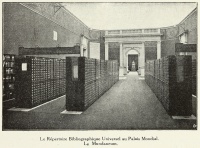Henri La Fontaine
From The Art and Popular Culture Encyclopedia
|
Related e |
|
Featured: |
Henri La Fontaine, (22 April 1854 – 14 May 1943) was a Belgian international lawyer and president of the International Peace Bureau from 1907 to 1943 who received the Nobel Prize for Peace in 1913.
La Fontaine studied law at the Free University of Brussels (now split into the Université Libre de Bruxelles and the Vrije Universiteit Brussel). He was admitted to the bar in 1877 and established a reputation as an authority on international law. In 1893, he became professor of international law at the Free University of Brussels and two years later was elected to the Belgian Senate as a member of the Socialist Party. He served as vice chairman of the Senate from 1919 to 1932.
La Fontaine took an early interest in the International Peace Bureau, founded in 1882, and was influential in the Bureau's efforts to bring about The Hague Peace Conferences of 1899 and 1907. He was a member of the Belgian delegation to the Paris Peace Conference in 1919 and to the League of Nations Assembly (1920-21). In other efforts to foster world peace, he founded the Centre Intellectuel Mondial (later merged into the League of Nations Institute for Intellectual Co-operation) and proposed such organizations as a world school and university, a world parliament, and an international court of justice. He is the co-founder of Institut International de Bibliographie (which later became the International Federation for Information and Documentation, FID) along with Paul Otlet.
Henri La Fontaine was the author of a number of legal handbooks and a documentary history of international arbitration. He was also founder of the review La Vie Internationale. Henri La Fontaine was a freemason, and a member of the lodge Les Amis Philanthropes in Brussels.


